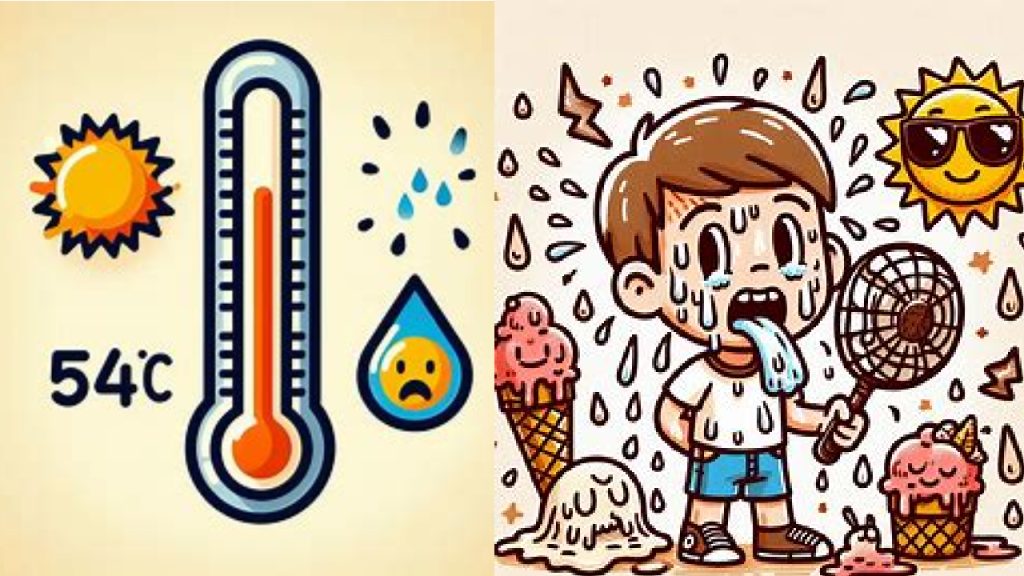The temperature has reached a lot these days. With the increase in temperature, we all are most likely to get a lot of diseases and strokes, especially Heatstroke.
Heatstroke is a condition caused by your body overheating, usually as a result of prolonged exposure to or physical exertion in high temperatures. This most serious form of heat injury, heatstroke, can occur if your body temperature rises to 104 F (40 C) or higher. The condition is most common in the summer months.
Two forms of heat stroke exist. Exertional heat stroke (EHS) generally occurs in young individuals who engage in strenuous physical activity for a prolonged period in a hot environment. Classic nonexertional heat stroke (NEHS) more commonly affects sedentary elderly individuals, persons who are chronically ill, and very young persons. Classic NEHS occurs during environmental heat waves and is more common in areas that do not typically experience periods of prolonged hot weather. Both types of heat stroke are associated with high morbidity and mortality, especially when cooling therapy is delayed.
It is the result of long, extreme exposure to the sun. In this case, a person does not sweat enough to lower body temperature. The elderly, infants, persons who work outdoors, people with mental illness, obesity, poor circulation, and those on certain types of medicines or drinking alcohol are most susceptible to heat stroke. It is a condition that develops rapidly.
With the influence of global warming, it is predicted that the incidence of heat stroke cases and fatalities will also become more prevalent. Behavioral responses are important in the management of temperature elevations and may provide clues to preventing the development of heat stroke.
Heatstroke requires emergency treatment. Untreated heatstroke can quickly damage your brain, heart, kidneys and muscles. The damage worsens the longer treatment is delayed, increasing your risk of serious complications or death.
Heatstroke signs and symptoms include:
- High body temperature. A core body temperature of 104 F (40 C) or higher, obtained with a rectal thermometer, is the main sign of heatstroke.
- Alteration in sweating. In heatstroke brought on by hot weather, your skin will feel hot and dry to the touch. However, in heatstroke brought on by strenuous exercise, your skin may feel dry or slightly moist.
- Altered mental state or behavior. Confusion, agitation, slurred speech, irritability, delirium, seizures and coma can all result from heatstroke.
- Nausea and vomiting. You may feel sick to your stomach or vomit.
- Rapid breathing. Your breathing may become rapid and shallow.
- Flushed skin. Your skin may turn red as your body temperature increases.
- Headache. Your head may throb.
- Racing heart rate. Your pulse may significantly increase because heat stress places a tremendous burden on your heart to help cool your body.
How can heat strokes be prevented?
- Drink plenty of fluids during outdoor activities, especially on hot days. Water and sports drinks are the drinks of choice. Avoid caffeinated tea, coffee, soda, and alcohol, as these can lead to dehydration.
- Wear lightweight, tightly woven, loose-fitting clothing in light colors.
- Increase time spent outdoors gradually to get your body used to the heat.
- Never leave children or pets in closed cars on warm or sunny days.
- Schedule vigorous activity and sports for cooler times of the day.
- Protect yourself from the sun by wearing a hat, sunglasses and using an umbrella.
- Try to spend as much time indoors as possible on very hot and humid days.
Treatment for heat stoke.
- Get the person to a shaded area.
- Remove clothing and gently apply cool water to the skin followed by fanning to stimulate sweating.
- Apply ice packs to the groin and armpits.
- Have the person lie down in a cool area with their feet slightly elevated.
- Cool the person rapidly however you can.

